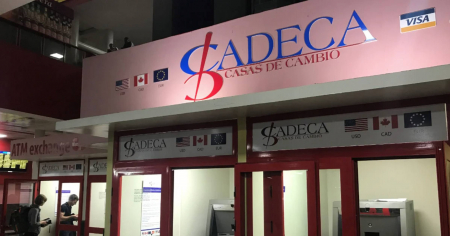The Cuban government announced this Wednesday the expansion of dollar stores throughout the national territory, as part of the partial dollarization process of the economy.
Ernesto Martínez, the first vice president of Corporación Cimex S.A., stated in the official program Mesa Redonda that this is a gradual effort to increase the presence of this type of business, especially in small markets that are easy to supply.
"For the incorporation of the stores, there has been consensus between Cimex and Tiendas Caribe with the principle that the opening of the new supermarket will focus on small markets that are easy to supply. This is especially true for those linked to the real estate sector and others associated with projects that will be signed and will promote both wholesale and retail sales across the country, but gradually," he explained.
The announcement comes amid a complex economic context, marked by the partial dollarization of the Cuban economy.
The regime has assured that accounts in freely convertible currency (MLC) will remain in the banks on the island, while defending the presence of the dollar in the economy.
Critics of this process, which includes stores operating in a foreign currency, have pointed out that this measure exacerbates inequalities, as a large part of the Cuban population does not have access to this currency and continues to receive their salary in the national currency.
Recently, the Supermercado de 3ra y 70 was inaugurated, located in Miramar, Havana, and the regime presented it as an "accessible" space "for the general population," despite the fact that the high prices in dollars make it unreachable for a large portion of Cubans.
This supermarket, inaugurated in January 2025, only accepts payments in cash dollars or through foreign cards, which has generated a strong backlash among citizens who depend on the Cuban peso (CUP).
The phenomenon of dollarization has been interpreted by many as a strategy to mask structural economic problems, such as food shortages and the lack of supplies affecting stores that operate in the national currency.
"These supermarkets only serve to collect dollars from those who receive remittances, have private businesses, or are foreign residents in Cuba," commented a netizen on social media.
Frequently Asked Questions About Opening Dollar Stores in Cuba
Why is the Cuban government opening stores that only accept dollars?
The Cuban government has decided to open stores that only accept dollars as part of a process of partial dollarization of the economy, aimed at attracting foreign currency and redirecting it towards state mechanisms. This measure seeks to control the flow of foreign currency and counter the illegal exchange market, although it has faced criticism for increasing economic inequalities.
How does the opening of these dollar stores affect the Cuban population?
The opening of dollar stores in Cuba exacerbates social inequalities, as most Cubans receive their salaries in national currency and do not have access to foreign currency. This limits their purchasing power in these establishments, which offer products at prices that are unreachable for many, thus worsening the economic and social crisis on the island.
What are the main criticisms of dollar stores in Cuba?
The main criticisms of dollar stores in Cuba focus on the fact that they widen the economic gap between those who have access to foreign currency and those who do not. It is argued that these stores are a reflection of the dollarization of the Cuban economy and that, rather than solving structural problems such as food shortages, they only benefit a minority with access to remittances or private businesses.
What has been the impact of dollarization on the informal currency market in Cuba?
The dollarization has had a significant impact on the informal currency market in Cuba, causing an increase in dollar exchange rates. This has further hampered access to foreign currency for the average Cuban, eroding the purchasing power of remittances and increasing pressure on the prices of basic goods.
Filed under:
